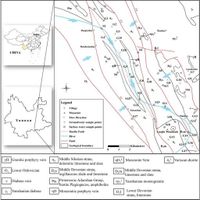The Jinzi River Basin in Yunnan Province, China, is facing increasing environmental challenges due to contamination from industrial and agricultural activities. A new study reveals the chemical characteristics of groundwater and surface water in the region, highlighting the significant impact of human interventions on water quality.
The area, which spans approximately 174 km², has a long history of unregulated mining activities that contribute both directly and indirectly to water pollution. The researchers collected a total of 40 water samples, including 19 from groundwater and 21 from surface water, focusing on the hydrochemical composition and the origins of major ions in these waters.
According to the study, the primary hydrochemical type of surface water is identified as HCO3-Ca·Na, whereas groundwater is predominantly classified as HCO3-Ca·Mg. This consistent hydrochemical pattern is significantly affected by local geological compositions, particularly the dissolution of carbonate and silicate rocks. The study found that the concentrations of ions were notably higher in areas underpinned by carbonate rock compared to silicate rock formations.
The researchers employed multivariate statistical methods, such as principal component analysis (PCA) and cluster analysis, to interpret the variations in water chemistry. They discovered that component concentrations in surface water, including sulfate (SO42−) and nitrate (NO3−), were predominantly influenced by human activities, significantly surpassing levels found in groundwater. This heightened sensitivity underscores the pressing need for water quality monitoring and management in areas vulnerable to contamination.
One critical finding of the research indicated that components such as SO42−, NO3−, Cl−, and total dissolved solids in surface water showed significant variation corresponding to levels of anthropogenic activities. The study noted, "Components such as SO42−, NO3−, Cl−, and total dissolved solids in surface water exhibited a pronounced sensitivity to human activities, with their concentrations significantly exceeding those in groundwater," wrote the authors of the article.
The implications of this contamination are extensive, as the runoff contributes to the degradation of water quality, critical for both ecosystem health and community well-being. Groundwater in the region generally exhibits lower salinity levels but is affected by similar human influences, such as untreated sewage and agricultural runoff.
This study adds vital data to the understanding of chemical interactions in surface and groundwater in the Jinzi River Basin, reinforcing the necessity for sustainable practices. Local authorities must promote effective strategies for pollution prevention to mitigate the adverse effects of mining and urban development on water resources.
The researchers highlighted the importance of understanding the geochemical processes that control water quality, particularly in regions facing significant human impact. The need for continuous assessment and adaptive management of water resources is critical to ensure both ecological integrity and the health of surrounding communities.
Future studies should delve into the long-term changes in these water systems, with particular emphasis on monitoring the ongoing impacts of human activities, in order to formulate proactive measures to safeguard these essential resources.
In essence, researchers urge that immediate actions are taken to address the wastewater discharges and mining impact on the Jinzi River Basin waters. Effective management strategies and regulatory reforms could establish a framework for protecting water quality, ensuring these essential resources remain viable for future generations.




